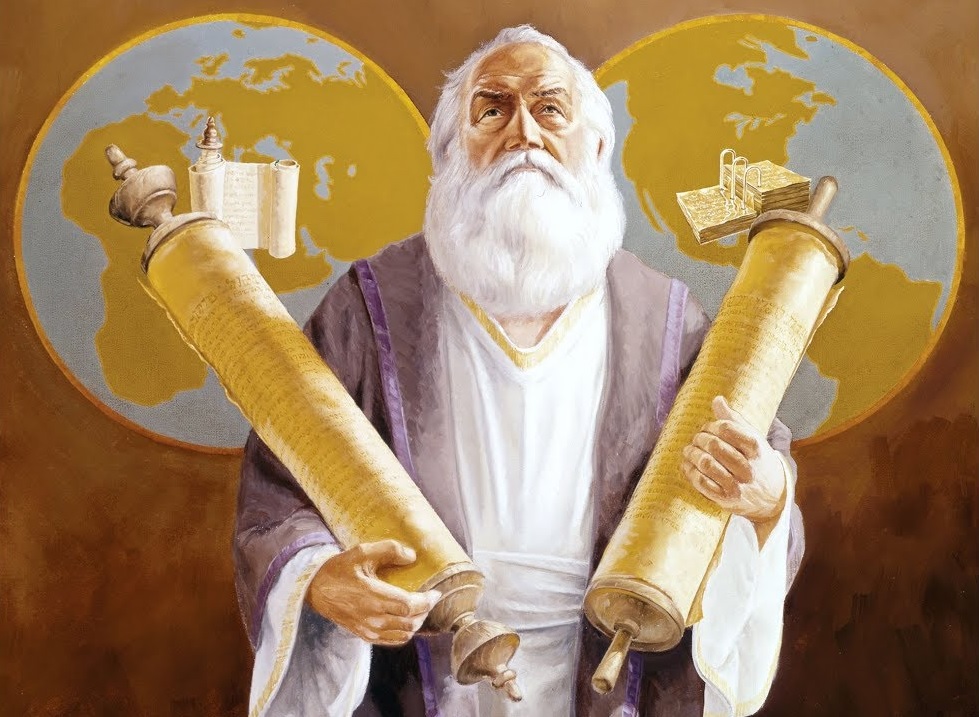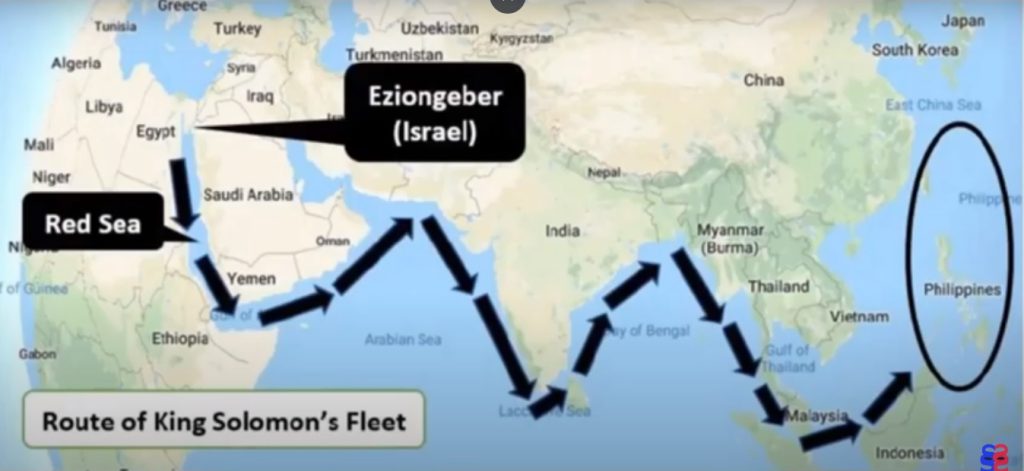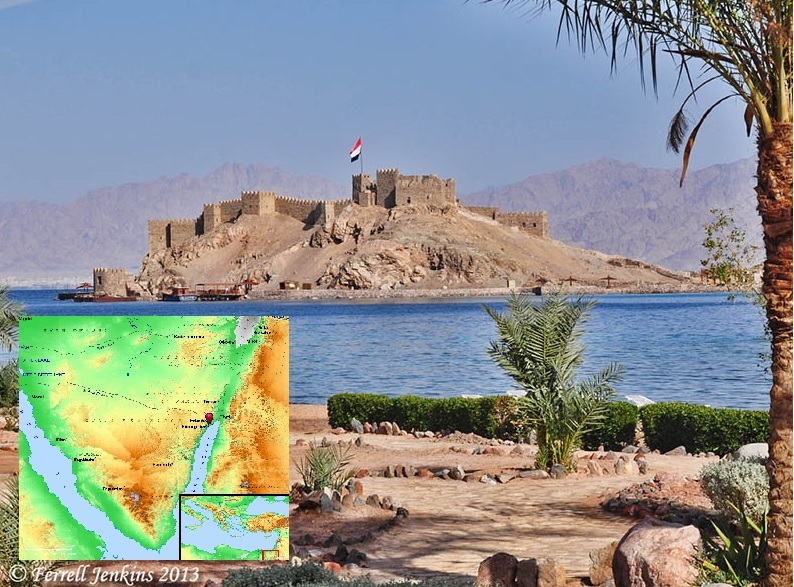Coastland versus Coastlands: The Prophetic Significance of their Meanings and Usages
Isaiah, one of the major OT prophets, indeed wrote numerous major prophecies about the promised Savior, about Israel, and about the nations that Yah judged for their wicked treatment of His people. Among the prophecies he wrote, many pertain to the coastland or coastlands which many scholars have commonly interpreted as regions not far from Israel, such as Egypt or Ethiopia. Others say those lands are “afar off” but they fail to agree on a common location. Many then of Isaiah’s writings remain unresolved or explained, much like the writings of John the Revealer.
The singular “coastland” is rendered as “i” (pronounced ee), meaning coast or region. It is used only 3 times in the New King James Version but not in the old KJV and in the NIV. (Please refer to the Table of Usage of the Words Coastland and Coastlands below.) This early, we must take to mind that “coastland” is not the same as “coastlands”, particularly when Isaiah and other prophets use either of the words. But many do not distinguish between the singular and plural forms and, thereby, get confused or confuse others. Why? Simply because the plural form “iye” or “iyim” refers to “coastlands”, “islands” or “countries on the sea”. For instance, Isa. 11:11 mentions the “islands of the sea”, rendered as ume iye hay yam, while Isa. 41:5 refers to the “coastlands” using iyim.
Let us illustrate the basic difference between the singular from the plural form.
The Mediterranean Sea is a large body of water separating Europe on the North and Africa on the South, while bordering Palestine on the East, and opening toward the West into the Atlantic Ocean. We can picture it as a body of water bounded by one long coastland (coastline or shoreline) that connects many nations. One can either travel by land from Spain to Morocco, for instance, all the way along the coast for days; or cross the sea on a boat within an hour.
On the other hand, coastlands or islands are tiny lands of varying sizes scattered or grouped together as an archipelago. UK is a group of islands which can properly be called “coastlands”, not a coastland. Egypt can be considered a “coastland” nation, but Malaysia is a “coastlands” country. The two can never be interchanged; that is, Egypt cannot be properly called “coastlands”. However, we can probably loosely say (figuratively but not technically) that southern Europe consists of the separate coastlands of different nations or peoples of varying languages and cultures. Hence, Jeremiah and Ezekiel do use the plural to refer to nations on the Mediterranean; however, Isaiah qualifies his use of the plural to refer to other regions. In Eze. 27:3, we read: “And say to Tyre, ‘You who are situated at the entrance (or gate) of the sea, merchant of the peoples on many coastlands (iyim) . . . .’ ” clearly referring to the land of Lebanon whose ships traded with various nations or coastlands. Notice that Tyre is not the coastlands mentioned but is itself actually a coastland which serves as the gate or entrance into (not of) the Mediterranean for those who live in Israel and surrounding nations.
Moreover, “coastland” or “coastlands”, as used in scriptures may also refer to the people who dwell therein; and so, we have to consider the essential difference of the two words in order to pinpoint the location of the region being mentioned. For the eastern coastland of the Mediterranean Sea covers many nations as well and have borders that separate them into their respective territories. Hence, one may then refer to the “coastlands” to mean “the nations or peoples” west of Jordan and east of the Mediterranean.
The context, therefore, will largely determine the real meaning of the form used. Hence, when Isaiah describes the “coastlands” as “afar off” or “far away”, we can safely say for sure that it does not refer to the nations west of Israel or even along the Mediterranean Sea. Some would think it is UK or even the United States; but Isaiah had all the people or nations of the world in mind. Hence, the whole globe has to be considered. We need more context now that we have clarified the issue of the noun used – “coastlands”.
Isa. 24:16 refers to the “coastlands” as the “wings or the ends of the Earth” (mikkenap ha ares). Obviously, he refers to the outermost boundaries of all inhabited nations or inhabited lands, even the islands within the globe. This now further qualifies what he meant by being “afar off” – so far that you have to reach the land or lands bounded by the great sea, no ordinary sea. We know it is the Pacific Ocean, not just the Atlantic Ocean, as some suppose and point to UK or even Spain as the place referred to. Likewise, some point to the American continent as the place; however, it does not fall under the descriptive word “islands” or “coastlands” as we have specifically defined it. Why? The western American coastland is essentially one long stretch of land from Alaska down to the tip of South America. It may be taken as the “coastlands” at the “ends of the Earth” (that is, westward and located at the eastern Pacific Ocean) but it is not a group of islands.
This then disqualifies the interpretation that the west (of Israel) is where the “coastlands” are. North and South may also come into the picture; but the ends of the Earth in those directions will bring us to ice lands where hardly any inhabitant dwells, least of all cities or nations.
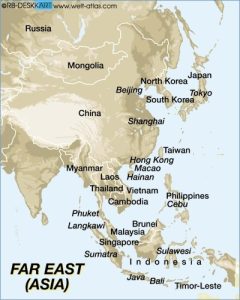
We then come to the ultimate and solid conclusion that the “coastlands” or “islands afar off” that Isaiah referred to is somewhere in the Far East. A new problem enters in that the whole of the Far East from north to south is practically scattered with islands, small ones and large ones. There is Japan, Malaysia, Indonesia, Papua New Guinea and the Philippines. Are we to take all of them or one particular group of islands – a nation?
The prophets refer to this far-off nation or people by various names. Ophir and Tarshish are the two names often used to refer to this place and to where King Hiram and King Solomon sent their navies to buy gold and other things:
Isa. 23:6 – Cross over to Tarshish, you inhabitants of the coastland.
1 Kings 9:28 – And they went to Ophir, and acquired four hundred and twenty talents of gold from there, and brought it to King Solomon.
2 Chron. 9:21 – For the king’s ships went to Tarshish with the servants of Hiram. Once every three years the merchant ships came, bringing gold, silver, ivory, apes, and monkeys.
Recall that the origins of those names point to the descendants of Noah through Shem, to whom the best part of the world was bequeathed. What made it the best part? It had all the precious resources needed for making a nation rich through trading. In particular, it will have the best gold, including silver, onyx, choice lumber, spices and other goods to make that nation wealthy. Hence, the primary qualification is that of being rich and being a source of goods that other nations would want to procure, apart from being a pivotal hub from which a vibrant global enterprise can be maintained. In fact, it is where Kings Solomon and Hiram acquired the gold to build the Temple in Jerusalem with, along with other materials and goods.
We definitely know that Ophir was where the precious gold came from and Tarshish and its ships were the means by which trading was conducted. Not only were Ophir and Tarshish related by blood (along with the former’s brothers, Sheba, Havilah, Jobab and others), they were tied through the generations that came after them up to the times of Solomon and Isaiah. In fact. Moses also wrote that the trip to and from Ophir took 3 years for Solomon’s navy to navigate both ways. “Afar off” now has a numerical value: 3 years of travel round-trip, most probably including rest and business activities in between trips.
Using what we have discovered so far, what event in world history can confirm this numerical value of “afar off”? Did not Columbus try to reach Ophir and failed because he ended up in the Western Indies, although he knew it would take him no less than 4 to 6 months of travelling west to reach it? But did not Magellan finally make it after crossing the Pacific Ocean for 4 months and after travelling more than a month beforehand from Spain to South America where they wintered for 2 months. Does that not show that starting from Spain, not Palestine, it would have taken him almost a year to reach the “coastlands” on presumably faster ships than those of Solomon? As the records now show, it took precisely 3 years to the month for Magellan-and-Elcano’s pioneering expedition to circumnavigate the world – from September 20, 1519 to Sept 6, 1522! All of 3 years, including ship repairs and refitting, trading, exploration, resupplying, rest and recreation, mutinies, battles, and other mishaps. Is this mere coincidence or affirmation of what Kings David, Solomon and Hiram had been doing for over 50 years through their navies made up of over 200 ships?
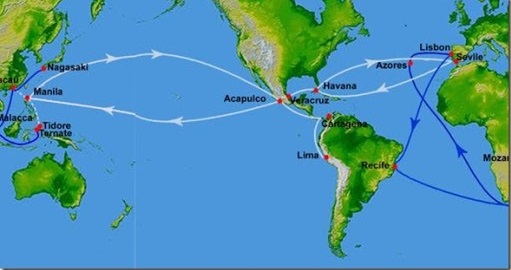
During the two-and-a-half century of the Manila-Acapulco Galleon Trade, ships were said to have crossed the Pacific Ocean every year one-way, giving us 2 years of travel time both ways. Add to the that the one-and-a-half month travel from Mexico to Spain from the Caribbean side, that adds up to 2 years and 3 months round-trip journey, but not including the time it had taken for ships to go around the tip of South America as Magellan had done, which would have taken months in both directions. And Moses’ record refers to 3 years from Israel to Ophir — yes, including travel time plying the Mediterranean Sea from Tyre to the Atlantic Ocean. Which is why Solomon had built a seaport in Ezion-Geber on the shore of the Gulf of Aqaba on the Red Sea in Elath to shorten the easterly route to Ophir. However, during King Jehoshaphat’s time, the ships and the port were destroyed. (1 Kings 9:26; 2 Chronicles 20:37)
So are we still looking for other “coastlands” in Africa, Europe and America until now? Is Ophir still a mystery to us in this highly-technological era? Were Isaiah and the prophets then writing fiction, myth or suppositions that have no real basis in geography and history? A true prophet of Yah only delivers truth. It is for his readers to believe and accept the truth or not. Yah will decide who love Him and His truth and those who do not – and who are foolish and who are wise. The queen of Sheba or Sebu sold and also brought gold as her gift to Solomon and learned so much from Solomon’s wisdom many millennia ago. Was the exchange fair? No, the queen was far richer in terms of gold for she owned the gold that Solomon bought. But Solomon was far richer in his wisdom than the queen. Yet, the queen learned much from Solomon’s wisdom and faith and became even richer than she had ever been before.
Wisdom is far more precious than silver and gold, Solomon said. So in the end, the queen remained far richer than Solomon with her gold and her acquired learning and wisdom which she “purchased” with her undiminished supply of gold, long before others came and lusted after her gold. And where did Magellan go to find the gold? To Sebu or Sheba! Was it coincidental or was he aware of the writings of Isaiah and the prophets?
An inquisitive queen who travels all the way to Jerusalem to meet Solomon would hardly go home without procuring the writings, songs, proverbs and poetry of Solomon. Ships of Tarshish plied the seas every other year or so back and forth between Ophir and Israel. What made her travel if not for the news she had heard? And what would have stopped her from acquiring and filling her kingdom and her people with the wisdom and skills of Solomon through the many years they had traded with each other?
Pigafetta had noted that the natives of the isles would often raise their hands, look up and say “Aba” or “Abba” as a form of exaltation. Had he learned some of their songs and poems, he would have told us more how much they knew about Abba Yahuah. It seems that fact had been conveniently omitted or deleted from the record. Notice, in particular, how not one single written record from that era from those natives has remained. Only those transcriptions of Spanish priests or scholars of the natives’ alphabet and a few stories of no great significance. So, they had an alphabet but had no written archives or cultural samples of their past and present? Hmmm, you would wonder how the queen of Sheba learned to weigh the gold she sold and gave as gift to Solomon. Or to be so eager to hear of Solomon’s wisdom and yet be so “illiterate” or “clueless” that she and her people never kept any journals or documents of their interactions with other nations, their experiences and their robust enterprises.
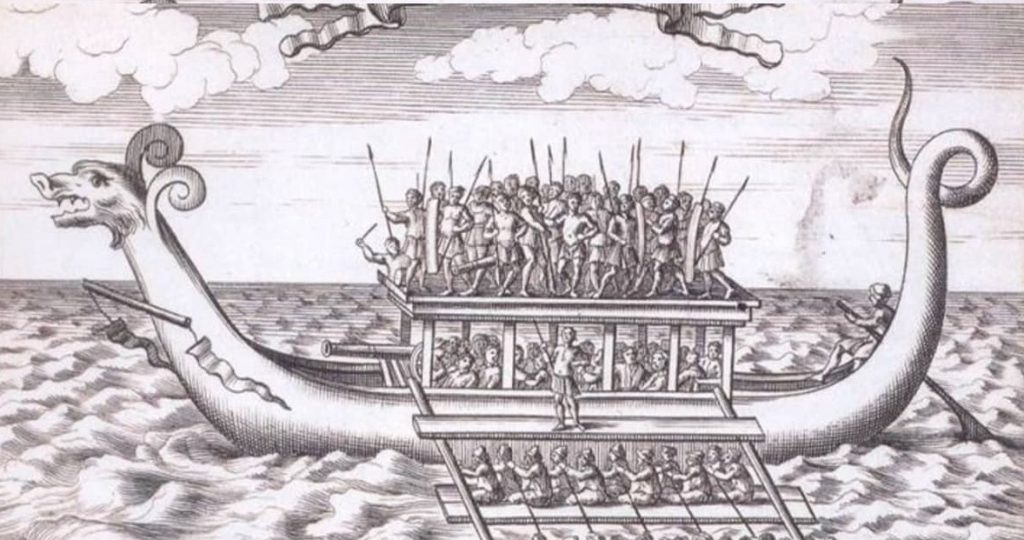
Is it any wonder then that the “coastlands” or “islands afar off” will sing out the praises of Yah, as Isaiah said? Who taught them the wisdom of Yah and the songs of His praises other than the one who gave them such lucrative business that Solomon gave, along with the other nations of the world who sought Ophir’s gold and Tarshish’s ships? Likewise, Pigafetta noted that the natives had hundreds of ships like the one shown above and even had large ones almost the same size or even bigger than the Spanish caravels. Imagine the firepower and military strength Spain had to send in order to annihilate the natives, their ships and their sovereignty.
And so, Spain eventually conquered Ophir and took his gold and ferried his treasures for almost 3 centuries to Europe using galleons. The conquistadors oppressed Ophir and destroyed the ships of Tarshish in order to claim the supremacy over many other nations. History will finally come full circle when the Maker will return the gold of Ophir and his rightful place in the family of nations. He does not sleep but will judge all the nations and peoples of the world. Isaiah and the prophets already foretold all that happened and will happen. Knowing what will happen from the things that happened long ago will help us lead our lives in accordance to His will.
Finally, the word coastland or coastlands contains a deep spiritual principle in its connotation as a place for resting, particularly for sailors who spend many years of their lives in the dangerous seas. This idea of rest and refreshing Isaiah presents as a divine promise or reward that Yahuah offers Israel, His wandering and scattered people. Isa. 28:1-15 pictures to us the “drunkards of Ephraim” whom Yah seeks to bring down from their pride to be trampled underfoot. Of the priests and prophets, Isaiah says: “They err in vision, they stumble in judgment. For all tables are full of vomit and filth; No place is clean.” Instead of receiving “rest with which you may cause the weary to rest” and the refreshing that such a rest will afford, they remain unfaithful to their True Heavenly King.
Sailing for a year or so can hardly offer a ship’s crew the genuine rest they deserve that they would achieve when they reunite with their family and live their normal lives. Moreover, it may take a week or more for sailors to regain their strength and land legs (to replace their sea legs); but true refreshing comes only when they get to eat as much food as they need to, sleep as long as they want to, and to savor the love and affection of family and friends as fully as other humans can. For to the lost tribes of Israelites and what Isaiah refers to as the “remnant of His people”, Yah had reserved a “crown of glory and a diadem of beauty”. Many may reject Him still or do not know Him yet; but the time will come when He will call them back to His prepared fold.
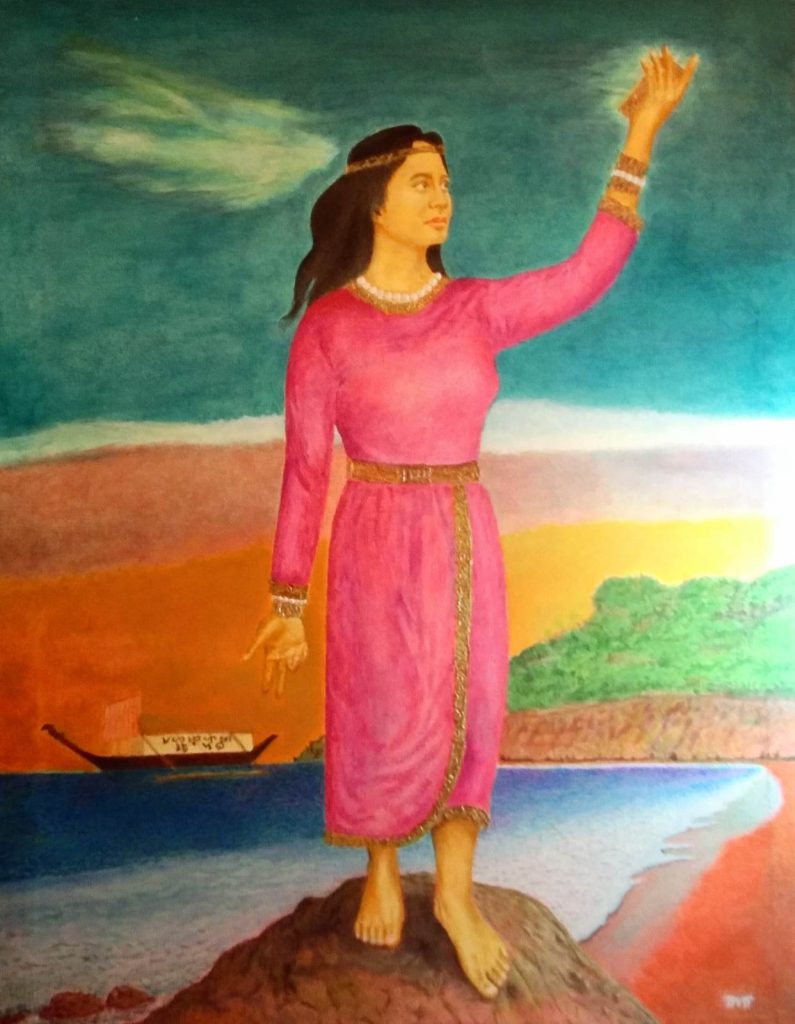
Isaiah uses the word coastland(s), isles or islands some 17 times in New King James Version and in majority of them, unlike the other prophets who were referring to neighboring places in general terms, he was specifically pointing to a place that had played a role back in the beginning of human history, in his present setting and far into the future when Yah shall have fulfilled all His promises to His chosen ones and passed His judgments upon the whole world. Hear the prophetic words of Isaiah, King Solomon and Yahusha Mashhiak Himself:
Isa. 66:19 – “I will set a sign among them; and those among them who escape I will send to the nations: to Tarshish and Pul and Lud, who draw the bow, and Tubal and Javan, to the coastlands (iyim) afar off who have not heard My fame nor seen My glory. And they shall declare My glory among the Gentiles.”
Psa. 72:10 – “The kings of Tarshish and of the isles (iyim) will bring presents; the kings of Sheba and Seba will offer gifts.” (Remember the gold, frankincense and myrrh from the kings of the East. This is very telling because Solomon himself, as king, received a huge tribute of gold from the queen of Sheba; and here he is prophesying about the kings of Sheba bringing gifts to the King in Heaven Who “”shall have dominion also from sea to sea, and from the River to the ends of the earth. Those who dwell in the wilderness will bow before Him, and His enemies will lick the dust.”)
Matt. 12:42 – “The queen of the South will rise up in the judgment with this generation and condemn it, for she came from the ends of the earth (peraton tes ges) to hear the wisdom of Solomon; and indeed a greater than Solomon is here“.
And just as Isaiah alludes to a great rest and refreshing, Yahusha reveals the ultimate plan for His people and those who stand against Him. His use of the phrase “ends of the Earth” denotes not just a geographical location which we have discussed but also connotes a spiritual reality when the “Earth reaches its end“. The Greek word peraton (ends) has the root word peras, meaning a boundary, limit, extremity, or an end, as in conclusion. Yahusha will not simply judge by His own will, might and testimony but will also call upon those who suffered under the wickedness of His enemies. In particular, His anger and condemnation of the Pharisees, Scribes and Sadducees and all other hypocritical brood of vipers pretending to be Yah’s servants will find expression through the testimonies of the queen of Sheba and her people who also did suffer (and continue to suffer) under the evil rule of the descendants of those ecclesiastical rulers. For whether we know it or not, all the wicked religions of the world that have allied themselves with the wicked governments of the world throughout history all fall under the great harlot, Mystery Babylon Religion, whose judgment and final end will come very soon. (Rev. 17:3-18)
As we approach that time of reckoning closer and closer, it behooves us to know more fully Abba Yahuah’s will for ourselves and for the world. Yes, beloved, there is still time to turn around and seek His will and His blessings for ourselves and our families. His messengers from ancient times still speak from the distant past in our times. His word is living and will give us life everlasting. Accept His gift of salvation through Yahusha Masshiak and receive the promised indwelling of Ruach Ha Kodesh (Holy Spirit) in your life. Amen!
Bible Verses Containing the Words Coastland, Coastlands and Isles
Coastland (Singular)
- Isa. 23:2 – “Be still, you inhabitants of the coastland (i), you merchants of Sidon, whom those who cross the sea have filled.”
- Isa. 23:6 – “Cross over to Tarshish, you inhabitants of the coastland (i).”
- Jer. 25:22 – “all the kings of Tyre, all the kings of Sidon, and the kings of the coastland (i) which is across the sea;
Coastlands/Isles/Islands (Plural)
- Gen. 10:4-6 – “From these the coastlands (iye) peoples of the Gentiles were separated into their lands, everyone according to his language, according to their families, into their nations.
- Isa. 11:11 – It shall come to pass in that day that the Lord shall set His hand again the second time to recover the remnant of His people who are left, from Assyria and Egypt, Pathros and Cush, from Elam and Shinar, from Hamath and the islands (iye) of the sea.”
- Isa. 24:15 – “Therefore glorify the Lord in the dawning light, the name of the Lord God of Israel in the coastlands (iye) of the sea.”
- Isa. 40:15 – “Behold, the nations are as a drop in a bucket, and are counted as the small dust on the scales; look, He lifts up the isles (iyim) as a very little thing.”
- Isa. 41:1 – “Keep silence before Me, O coastlands (iyim), and let the people renew their strength! Let them come near, then let them speak; let us come near together for judgment.”
- Isa. 41:5 – “The coastlands (iyim) saw it and feared, the ends of the earth were afraid; they drew near and came.”
- Isa. 42:4 – “He will not fail nor be discouraged, till He has established justice in the earth; and the coastlands (iyim) shall wait for His law.”
- Isa. 42:10 – “Praise to the Lord. Sing to the Lord a new song, and His praise from the ends of the earth, you who go down to the sea, and all that is in it, you coastlands (iyim) and you inhabitants of them!”
- Isa. 42:12 – “Let them give glory to the Lord, and declare His praise in the coastlands (iyim).”
- Isa. 42:15 – “I will lay waste the mountains and hills, and dry up all their vegetation; I will make the rivers coastlands (iyim), and I will dry up the pools.”
- Isa. 49:1 – “Listen, O coastlands (iyim), to Me, and take heed, you peoples from afar! The Lord has called Me from the womb; from the matrix of My mother He has made mention of My name.
- Isa. 51:5 – “My righteousness is near, My salvation has gone forth, and My arms will judge the peoples; the coastlands (iyim) will wait upon Me, and on My arm they will trust.”
- Isa. 59:18 – “According to their deeds, accordingly He will repay, fury to His adversaries, recompense to His enemies; the coastlands (iyim) He will fully repay.”
- Isa. 60:9 – “Surely the coastlands (iyim) shall wait for Me; and the ships of Tarshish will come first, to bring your sons from afar, their silver and their gold with them, to the name of the Lord your God, and to the Holy One of Israel, because He has glorified you.”
- Isa. 66:19 – “I will set a sign among them; and those among them who escape I will send to the nations: to Tarshish and Pul and Lud, who draw the bow, and Tubal and Javan, to the coastlands (iyim) afar off who have not heard My fame nor seen My glory. And they shall declare My glory among the Gentiles.”
- Eze. 26:15 – “Thus says the Lord God to Tyre: ‘Will the coastlands (iyim) not shake at the sound of your fall, when the wounded cry, when slaughter is made in the midst of you?’ ”
- Eze. 26:18 – “Now the coastlands (iyin) tremble on the day of your fall; yes, the coastlands (iyim) by the sea are troubled at your departure.” ’
- Eze. 27:3 – “and say to Tyre, ‘You who are situated at the entrance of the sea, merchant of the peoples on many coastlands (iyim), thus says the Lord God: ‘O Tyre, you have said, ‘I am perfect in beauty.’ ‘ ”
- Eze. 27:15 – “The men of Dedan were your traders; many isles (iyim) were the market of your hand. They brought you ivory tusks and ebony as payment.”
- Eze. 27:35 – “All the inhabitants of the isles (iyim) will be astonished at you; their kings will be greatly afraid, and their counte-nance will be troubled.”
- Eze. 39:6 – “And I will send fire on Magog and on those who live in security in the coastlands (iyim). Then they shall know that I am the Lord.”
- Dan. 11:18 – “After this he shall turn his face to the coastlands (iyim), and shall take many. But a ruler shall bring the reproach against them to an end; and with the reproach removed, he shall turn back on him.”
- Psa. 72:10 – “The kings of Tarshish and of the isles (iyim) will bring presents; the kings of Sheba and Seba will offer gifts.”
- Psa. 97:1 – “The Lord reigns; let the earth rejoice; let the multitude of isles (iyim) be glad!”
(Maps and paintings of Isaiah and Karakoa c/o Google, posted under Fair Use Clause)
(Please visit the YouTube source of the map of Solomon’s route to Ophir above here: “Solid Evidence That Philippine Is The Biblical Ancient Land of Ophir“)
